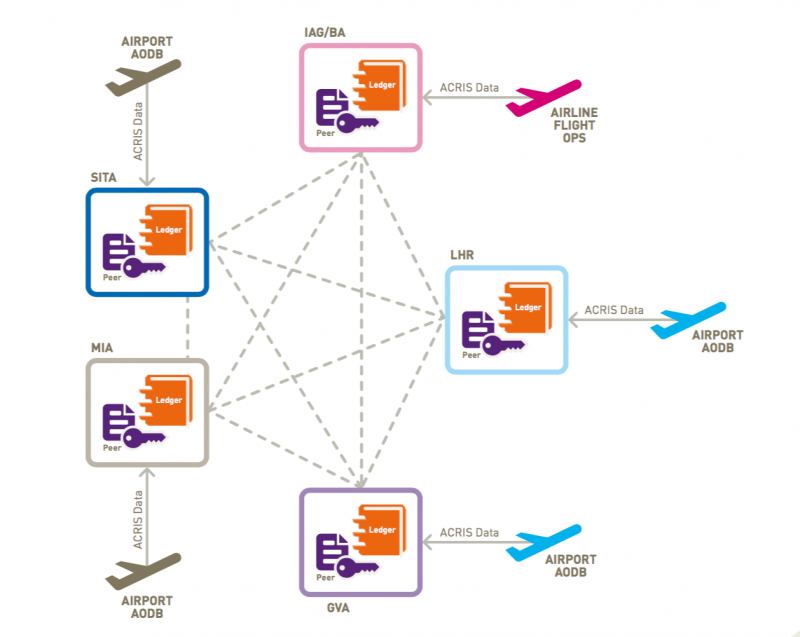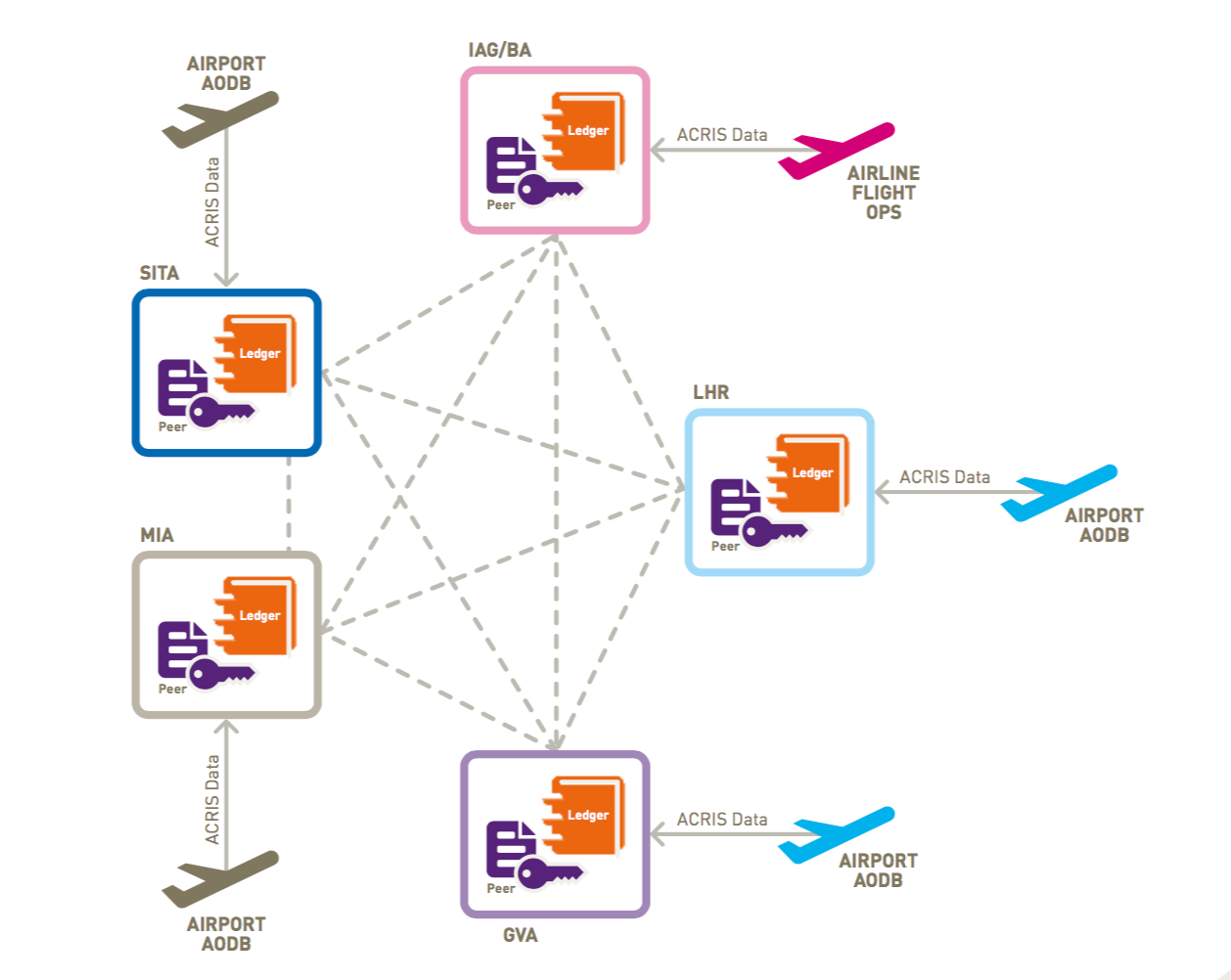
SITA partners with airlines and airports to explore Blockchain
By cameron in Uncategorized
SITA has published research on blockchain technology, conducted with British Airways, Heathrow, Geneva Airport, and Miami International Airport.
The white paper explores ‘smart contracts’ for shared control of data in a secure manner.
Kevin O’Sullivan, SITA Lab, presented some of the learnings of the FlightChain trials during a tnooz session on blockchain at WTM London.
The FlightChain paper looks at the strengths of blockchain for communicating “a single source of truth for flight data” that would resolve ongoing issues with conflicting status when data is held in separate silos at the airline or the airport.
As a result, when there are flight delays, passenger apps, airport FIDS, and airline agents may all have different information on when a flight will depart or arrive.
FlightChain was designed as a private permissions blockchain—using Ethereum and Hyperledger-Fabric—which stores flight information and uses a smart contract to reconcile any conflicting data.
Ethereum is an open source blockchain which supports smart contracts was run as a private network during the trials.
Hyperledger is a consortium of companies working to advance blockchain enterprise applications with members—including IBM, Accenture, Intel, American Express—working to speed up blockchain technology adoption by sharing learnings from their own projects.
Fabric is one of the blockchain implementations resulting from Hyper ledger, developed by IBM and open sourced.

Jim Peters, CTO, SITA, says of the FlightChain research program:
“The project has demonstrated that blockchain is a viable technology to provide a single source of truth for data for airlines and airports, specifically for real-time flight information.
“While there are other technologies available for sharing data, the use of blockchain, and smart contracts in particular, provides ‘shared control’ and improves the trustworthiness of the data.
“In a real-world network, it will be important to manage the changes to the smart contract as it affects all participants.
“We can imagine a future where industry standards are written directly as smart contracts instead of published as PDF documents.”
During the trials conducted between British Airways, Geneva Airport, Heathrow and Miami Internaitonal Airport, FlightChain handled and stored more than two million flight changes.
Managing chains
One key lesson from the trials was that even a private permission blockchain, like FlightChain, still requires governance and operational oversight, to ensure its integrity is not compromised.
As SITA reports:
“In a public network there is no central leadership or control over the direction of the network — it is truly distributed and decentralized.
“This can result in slow decision making about the future direction of the blockchain, heated debate and splintering of a group.
“An example of this is the contention between the bitcoin development team (also known as Bitcoin Core) and the major mining consortiums which resulted in a fork of bitcoin in August 2017.
“As a consequence, two bitcoin blockchains emerged. Similar forks have happened in Ethereum (but in that case the fork was to reverse a hack of the network).”
The white paper proposes that industry organizations such as ACI, IATA or SITA could serve in the governance role, to manage the governance of the public blockchain for numerous functions.
The paper also warns that, at least for now, cloud-based data sharing services are easier to implement and manage than blockchain, despite the data reconciliation advantages of the latter. As reported in the SITA white paper:
“One of the key lessons of FlightChain is that it would be complex to scale a network to many participants, especially when onboarding new airlines and airports after initial setup.”
SITA cautions against companies trying to go it alone, unless they have staff with the requisite skillsets. Some may want to wait for the technology to mature.
Smart contracts
The smart contracts which, serve to update and reconcile data in the blockchain, can also be complicated and require strong lifecycle management.
In essence they are composed of a set of business rules which are applied as a transaction on the blockchain to ensure data integrity.
They are the final logic which decides which among various data points on a transaction will be considered as the true status and updated along the chain.
They ensure fair control over data, with no member of the chain having preferential influence on data sets to their own benefit, and also protect data from manipulation by unauthorized parties.
For example, smart contracts would prevent Ryanair from updating flight data for British Airways and would keep Munich Airport from changing the schedules on a flight from Heathrow to Madrid.
But the rules governing smart contracts must be defined, updated and redefined as needed to support the business application.
These contracts are not legally binding, and require arbitration to ensure consistency and fairness of their application.
The SITA white paper suggests that industry standards could be developed and applied for this purpose.
Security and integrity
Of concern is ensuring that the blockchain is protected from outside interference. As a private network distributed among multiple enterprises, SITA says, blockchain is only “as strong as its weakest link.”
“The attack vectors are similar to those on a traditional enterprise system, and similar defenses and monitoring need to be in place.
“The added complication of a distributed system like a blockchain network is that you are relying on all participants to have these defenses in place.
“It is not necessary to breach all nodes on a network, only one.”
One security layer is that Flight Chain would be set up as a private network, requiring specific permissions which can be limited to viewing only, transacting or verification.
While, for the purposes of the trial data was unencrypted, SITA predicts that data may need to be encrypted on large scale applications, or access tightly limited.
Blockchain is viable with more work ahead
While the FlightChain study helps identify potential complications for aviation applications, blockchain’s ability to ultimately reconcile data quickly and ensure consistency of data at various stakeholders in different parts of the world is appealing and promises to make aviation more efficient.
Bottom line, there needs to be more work done to define the smart contracts, and ensure a universal methodology for data integrity and security.
Stuart Harwood, Heathrow Automation and Innovation, HAL, says:
“Heathrow’s participation in FlightChain with SITA Lab has been very valuable. We are still early in the blockchain technology cycle and more research is required but FlightChain has shown the opportunities for shared control of data with our industry partners.”
Glenn Morgan, Head of Digital Business Transformation at International Airlines Group (IAG), says:
“Now we’ve proven the technology, we are really excited by the opportunities that blockchain can create in the industry. We will work with IATA and ACI to ensure the best practices are in place.”
Next steps will include adding more airline and airport stakeholders to FlightChain trials, refining FlightChain smart contracts, and identifying a business model to fund the project.
Related reading:
Amadeus offers its take on Blockchain
![]()

